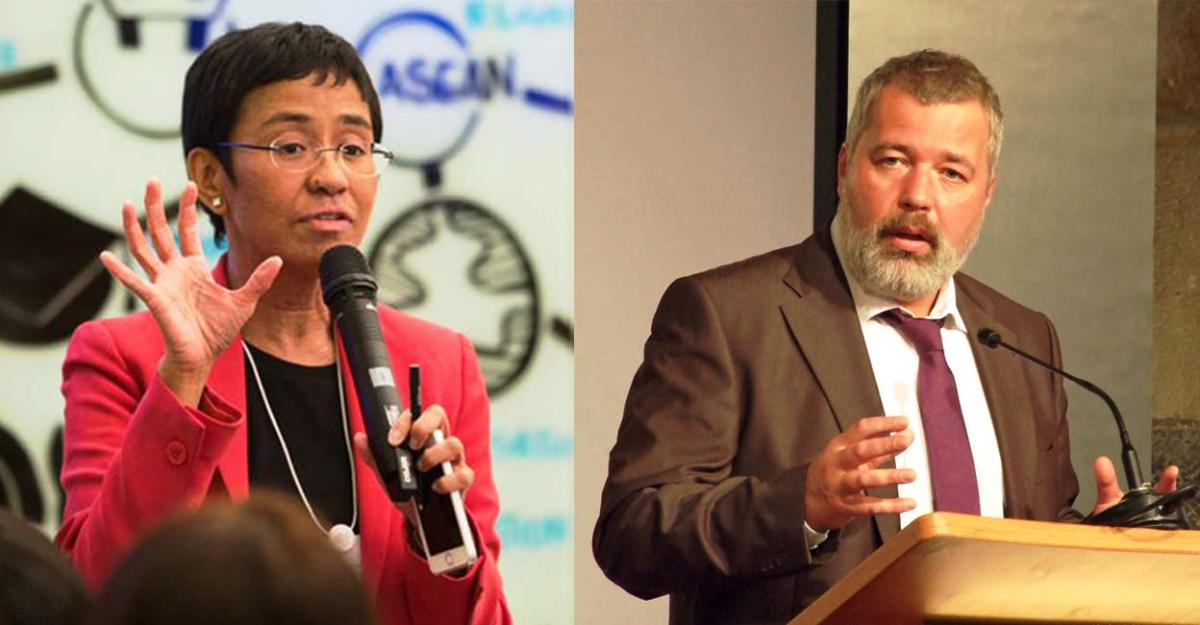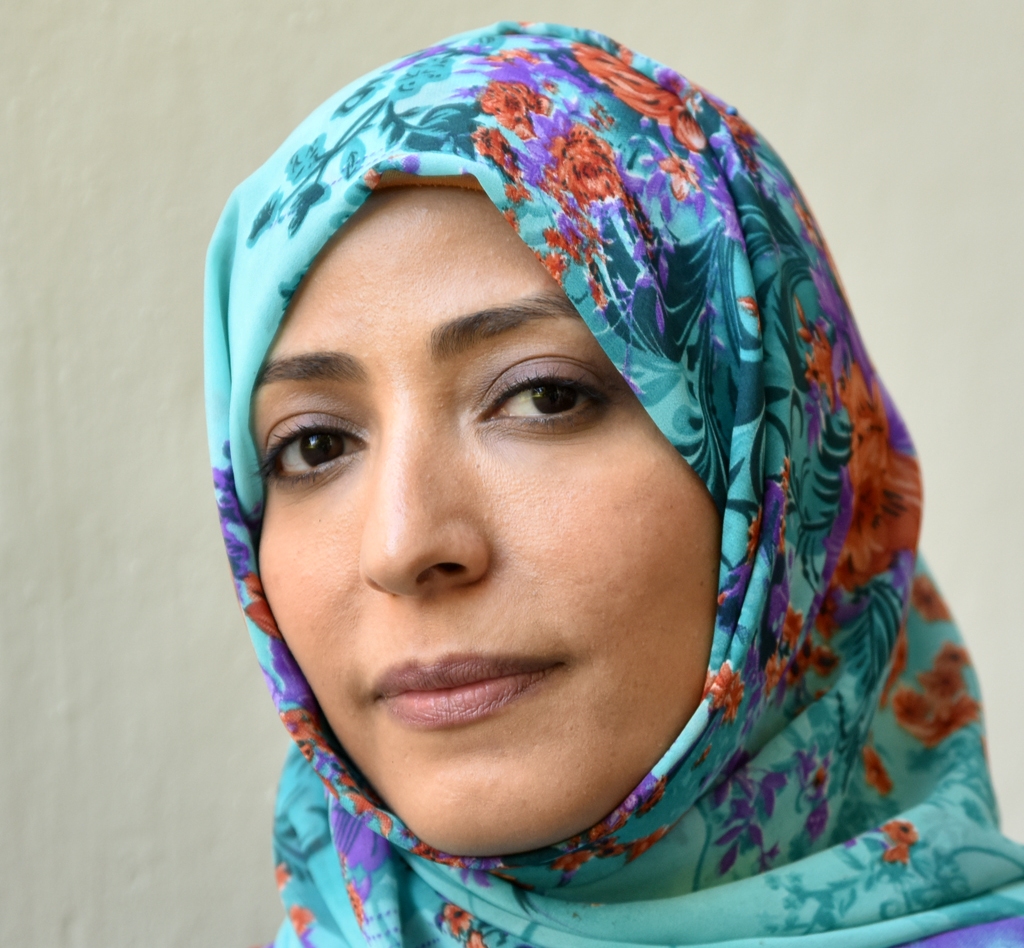by Minhaj Masoodi
SRINAGAR: Recently, two journalists hogged the headlines for becoming the first journalists for bagging the Nobel Prize. Maria Ressa and Dimitry Muratov were awarded the Nobel for their “efforts to safeguard the freedom of expression”.

“The Norwegian Nobel Committee has decided to award the Nobel Peace Prize for 2021 to Maria Ressa and Dmitry Muratov for their efforts to safeguard freedom of expression, which is a precondition for democracy and lasting peace,” read the press statement issued by the Nobel Committee.
“Ms Ressa and Mr Muratov are receiving the Peace Prize for their courageous fight for freedom of expression in the Philippines and Russia. At the same time, they are representatives of all journalists who stand up for this ideal in a world in which democracy and freedom of the press face increasingly adverse conditions,” the statement further read.
Ressa, a Filipino journalist is a co-founder and the CEO of a digital media organization, Rappler. Her organization’s critical coverage of President Duterte’s drug war and blatant use of violence had resulted in threats and harassment from his administration.
Similarly, Dimitry Muratov, a Russian journalist, with whom Ressa shared her Nobel is the editor-in-chief of Novaya Gazeta, a media organization, which has critically reported on a range of topics from police violence, unlawful arrests, electoral fraud and troll factories, as well as the use of Russian military forces both within and outside Russia.
Dimitry and his organization had thus faced intimidation from the Kremlin in the form of threats, harassment and violence. It has even lost six of its journalists who were murdered because of their work.
However, this is not the first time that journalists have won the Nobel Prize. Half a dozen journalists prior to them, have also been given the Nobel for their efforts to defend freedom of speech and expression. As it also falls under the category of peace efforts, the Nobel committee has recognized such efforts in the past as well.
Journalists such as Carl Ossietzky, Norman Angell, Alfred Hermann, Tawakkol Karman among others have also been recipients of the Nobel Peace Prize.
A Muslim Journalist
Tawakkol Karman, a Yemeni journalist, activist and politician was awarded the Nobel in 2011 at the age of 32 “for non-violent struggle for the safety of women and for women’s rights to full participation in peacebuilding work.” She shared the prize with two other people.

She co-founded the Women Journalists Without Chains in 2005. The group was founded to combat repression and for advocacy of freedom of expression and speech. It produces reports of the HR abuses against the press in Yemen.
She had also led protests against the now exiled Yemeni President Ali Abdullah Saleh and actively took part in the 2011 Arab Spring. She has also been arrested on many occasions.
The Norwegian Nobel Committee had said that it hoped, among other things, that the 2011 prize would “help to bring an end to the suppression of women that still occurs in many countries”.
A Nazi Fighter
Ossietzky was awarded the Nobel in 1935 “for his burning love for freedom of thought and expression and his valuable contribution to the cause of peace.”
Ossietzky had worked for multiple organizations during his career. In 1926, he assumed the role of chief editor of Die Weltbuhne (The World Stage), after its founding editor, Siegfried Jacobsohn died. Die Weltbuhne was a German weekly magazine focused on politics, art and business.
The magazine published an article written by Berthold Jacob which criticized the “Reichswehr for condoning paramilitary organizations”. Reichswehr was the unified armed force of the Weimar Republic from 1919 to 1935 till the initial years of Nazi rule.
Being the editor, Ossietzky was tried, convicted and given a prison sentence of one month. Undeterred, Ossietzky published another article, this time by Walter Kaiser which opposed the secret rearmament of Germany which was violative of the Peace Treaty of Versailles, 1919.
This time, Ossietzky was charged with treason and sentenced to an 18-month prison sentence but was released within seven months after being granted amnesty in 1932. However, in 1933, he was rearrested and lodged in a concentration camp. Having become a traitor to many in Germany, he became the “symbol of democratic resistance” against Hitler’s Nazi regime. Exiled Germans and the anti-fascists in various countries campaigned hard for him to secure a Nobel.
Ossietzky was awarded the prize in 1935 much to ‘Fuhrer’s’ fury. The regime disallowed him to leave the concentration camp to receive the prize, demanding that he decline it. However, Ossietzky refused.
Consequently, Hitler forbade the German press from commenting on Ossietzky’s award and banned Germans from receiving the prize in future.
Ossietzky was kept under surveillance right until his death in a hospital.
The Angellism Founder
Similarly, Norman Angell, a British Journalist also won the Nobel Peace Prize in 1933. The British scribe was awarded the Nobel “for having exposed by his pen the illusion of war and presented a convincing plea for international cooperation and peace.”
After emigrating to America, he worked odd jobs but eventually came to be a reporter and wrote for many publications and American newspapers. He became the editor of the Paris edition of Daily Mail in 1905, however, resigning in 1912 to dedicate himself to writing and lecturing.
In 1910, Norman wrote his most famous work, The Great Illusion. The book was translated into 25 languages and sold over two million copies. He argued that the nature of war was such that it enabled mutual destruction of both the aggressors and the defenders, which ultimately made the armed conflict unprofitable. An idealistic pacifist, he believed that expansion of free trade would enable economic interdependence of countries on one another and improving standards of education would make war irrational and uncivilized, a concept that came to be known as Angellism.
He tackled many other issues in his different works ranging from currency problems, patriotism, security among others. An ardent defender of the League of Nations, he was a member of its Executive Committee of the League of Nations and of the National Peace Council.
He was awarded the prize by the Nobel Committee in the autumn of 1934 but had been reserved since 1933.
The Pacifist Movement
Likewise, Alfred Hermann Fried was awarded the Nobel Peace Prize in 1911. The Vienna born journalist received the prize “for his effort to expose and fight what he considered to be the main cause of war, namely, the anarchy in international relations.”
Fried pursued most of his journalistic career in Germany and became actively involved in the peace movement and founded the Deutsche Friedensgesellschaft (German Peace Society) and edited its major publication Monatliche Freidenskorrenspondenz (Monthly Peace Correspondence) from 1894 to 1899.
He then started a peace journal named Die Waffen Nieder (Lay Down Your Arms) which was replaced in 1899 by Die Freidenswarte (The Peace Watch), which he edited and which Norman Angell had famously called “the most efficient periodical of the Pacifist movement in the world.”
Fried blamed international anarchy as the reason for the wars. He said that International Anarchy is the condition that manifests wars.
“If we wish to substitute for war the settlement of disputes by justice, we must first substitute for the condition of international anarchy a condition of international order,” he had said.
However, when the First World War started, his pacifist activities were hampered because of the government censorship and he was forced to shift to Switzerland. He was accused of treason by the Austrian government and was only able to return after the war had ended.
Alfred Hermann published Mein Kriegstahgebuch (My War Journal) detailing his and his colleague’s sentiments and activities during the war. He also led a journalistic campaign against the Treaty of Versailles, which was deemed by many as unfair to Germany and its allies such as Austria.
Many other journalists such as Italian, Ernesto Moneta, Elic Ducomann and Tawakkol Karman have also been awarded the Nobel Peace Prize.
Helping France And Italy
Moneta was awarded the prize in 1907 “for his work in the press and in peace meetings, both public and private, for an understanding between France and Italy. From a military background, Moneta became the editor of the daily newspaper, Il Secolo, from 1867 to 1895, which was published in Milan.
As per Nobel Lectures, “he forged Il Secolo into a powerful instrument for shaping public opinion without compromising its editorial balance.”
Traditionally, in a very conservative society, his Il Secolo took an anticlerical stance and called out the abuses among the clergy. He believed their abuses impeded the social progress and unification of Italy.
His seminal work, Le guerre, le insurrezioni e la pace nel Secolo XIX (Wars, insurrection and Peace in the Nineteenth century) was published in four volumes and focused on the military instead of social or economic issues and emphasized on the lack of substantive achieved by wars and militarism.
He also participated in peace congress represented Italy in the Commission of International Peace Bureau in 1895
International Peace Bureau
Ducomann was a Swiss peace advocate and was awarded the prize in 1902 “for his untiring and skilful directorship of the Bern Peace Bureau.”
In 1891, he became the honorary general secretary of the International Peace Bureau, which linked peace organizations in different countries. However, he was also a journalist and edited the political journal Revue de Geneve and founded the radical journal Der Fortschritt (Progress).















